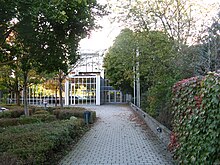Max Planck Institute for Quantum Optics
 |
|
| Abbreviation | MPQ |
|---|---|
| Formation | 1981 |
| Location | |
| Leader | Prof. Dr. Ignacio Cirac |
|
Staff
|
350 |
| Website | http://www.mpq.mpg.de/cms/mpqhome/index.html |
The Max-Planck-Institute of Quantum Optics (abbreviation: MPQ; German: Max-Planck-Institut für Quantenoptik) is a part of the Max Planck Society which operates 87 research facilities in Germany.
The institute is located in Garching, Germany, which in turn is located 10 km north-east of Munich. Five research groups work in the fields of attosecond physics, laser physics, quantum information theory, laser spectroscopy, quantum dynamics and quantum many body systems.
The institute conducts investigations in quantum physics. The faculty members conducts research in topics such as theoretical quantum optics, quantum information theory, ultra-high-resolution laser spectroscopy, quantum physics of ultra-cold atoms, development of components for quantum computers and quantum networks, Bose-Einstein condensation of degenerate quantum gases, attosecond physics, development of new radiation and particle sources for fundamental and medical applications, etc. There was a group at MPQ that conducted experiments on gravitational waves.
The Max-Planck-Institute of Quantum Optics was founded on January 1, 1981. It was a successor of a project group for laser research of the Max Planck Institute for Plasma Physics. The use of lasers for fusion research, quantum optics and spectroscopy were the goals of the project group, which was established in 1976 and consisted of 46 members. In 1981 the staff numbers had risen to 82 and the institute was comprising the divisions of Laser Physics (Prof. Herbert Walther), Laser Chemistry (Prof. Karl-Ludwig Kompa) and Laser Plasma (Dr. Siegbert Witkowski).
The institute was accommodated for a time on the premises of the Max Planck Institute for Plasma Physics. The institute moved to the new building in July, 1986 and officially separated from the Max Planck Institute for Plasma Physics. With the appointment of Theodor Hänsch (then at Stanford University) as new director, the institute grew significantly. Hänsch established the Laser Spectroscopy Division and was also given a chair at the Ludwig Maximilians Universität Munich which ensured close links between MPQ and the university complex in Munich. After the retirement of Siegbert Witkowski in 1993, the research on the high energy laser was stopped and other research areas were started.
...
Wikipedia
